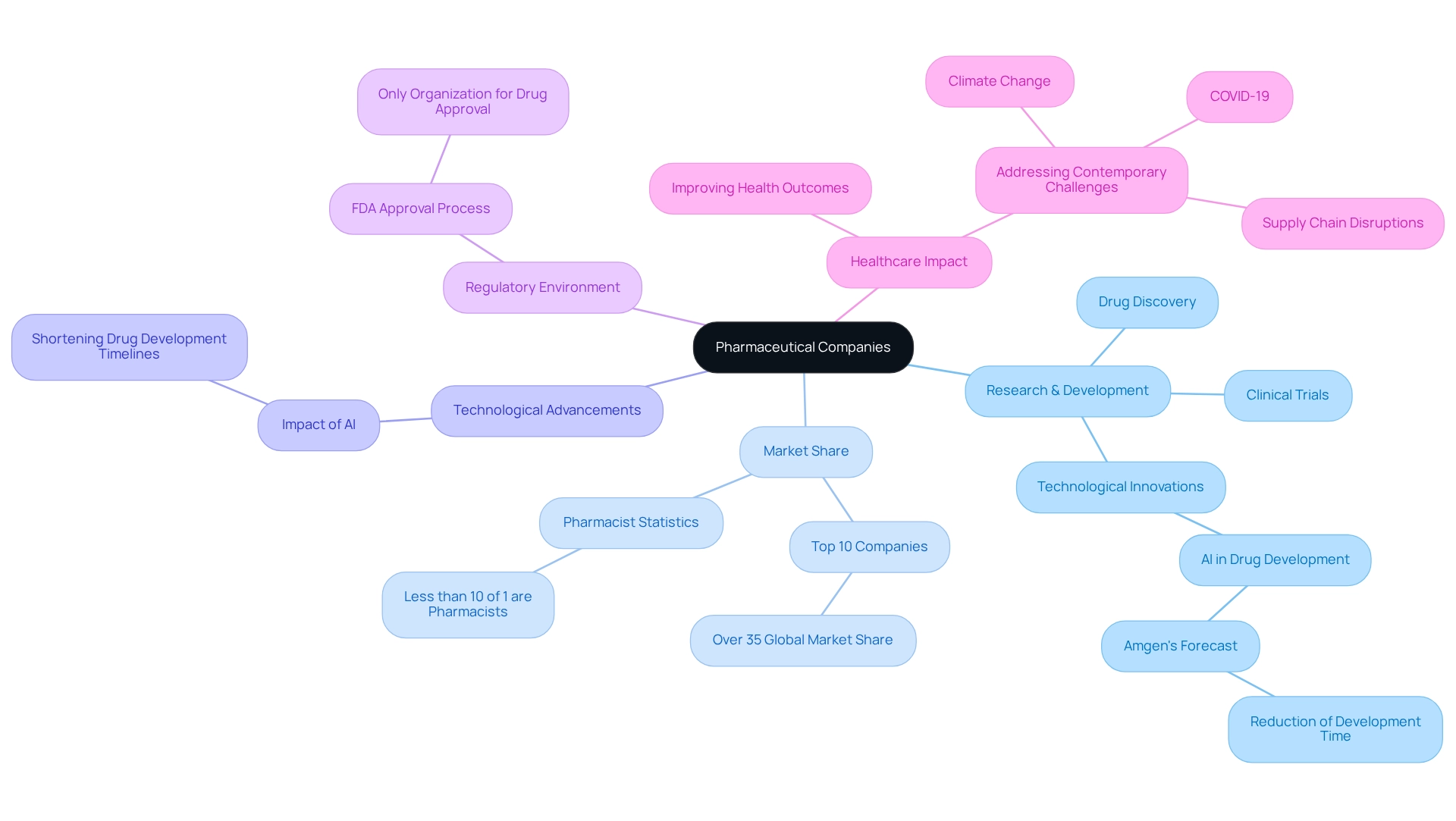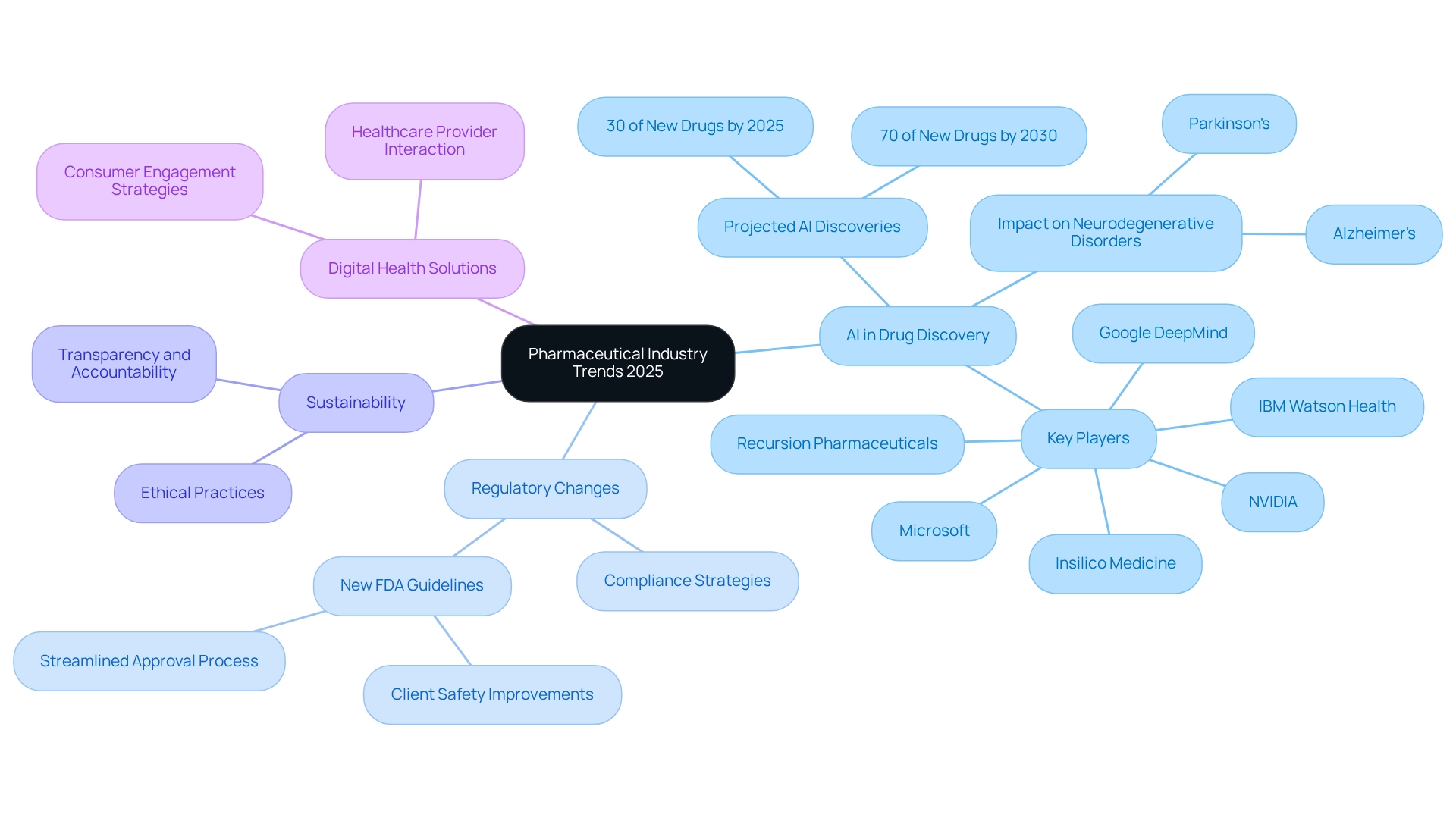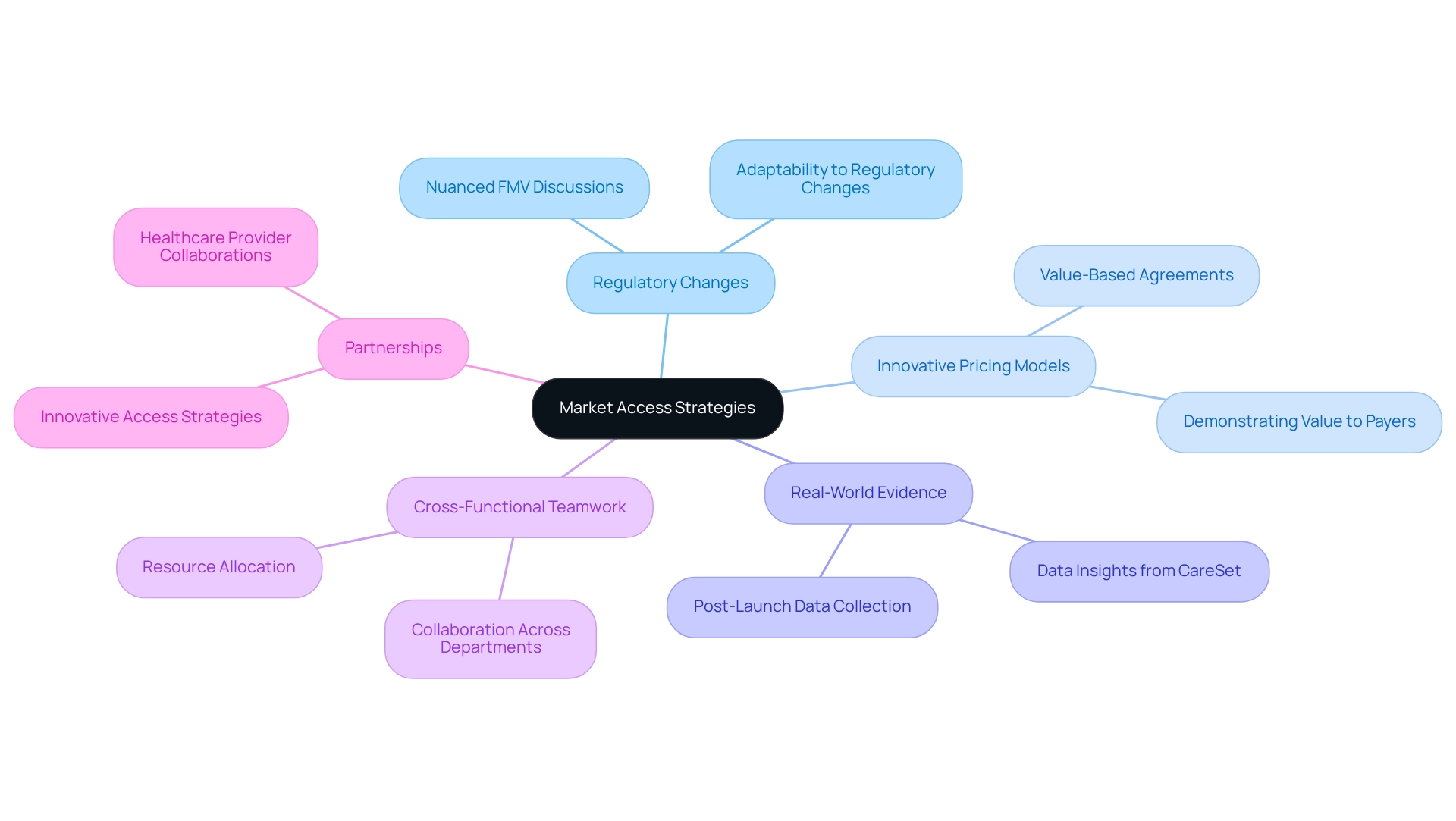Overview
The article titled “Understanding Pharmaceutical Companies News and Its Impact in 2025” examines the evolving role of pharmaceutical companies within healthcare and the significant trends that will shape the industry by 2025. It underscores that advancements in technology—especially artificial intelligence—coupled with regulatory changes and a shift towards patient-centered care, are fundamentally transforming drug development and market access strategies. These developments are enhancing the overall effectiveness and accessibility of healthcare solutions, marking a pivotal moment for the industry as it adapts to meet the needs of a changing landscape.
Introduction
In the rapidly evolving landscape of healthcare, pharmaceutical companies emerge as pivotal players, driving innovation and ensuring patient access to essential medications. As they navigate the complexities of research, development, and regulatory compliance, these organizations bear the responsibility not only of creating new drugs but also of adapting to technological advancements and shifting market demands.
By 2025, the integration of artificial intelligence and data analytics is poised to revolutionize drug discovery, while new pricing models and value-based agreements are reshaping market access strategies. Amidst these transformations, the commitment to patient-centered care and ethical practices remains paramount, underscoring the critical role pharmaceutical companies play in improving health outcomes and addressing contemporary challenges.
Define Pharmaceutical Companies and Their Role in Healthcare
Pharmaceutical companies news indicates that pharmaceutical firms are integral to the healthcare ecosystem, focusing on the research, development, production, and promotion of medications and medical devices. They lead the way in discovering new drugs, ensuring their safety and efficacy, and facilitating patient access to these essential treatments. These organizations drive a significant portion of medical advancements, which are vital for improving health outcomes and effectively managing diseases. Their operations encompass a diverse range of activities, including fundamental research, clinical trials, and adherence to regulations, frequently reported in pharmaceutical companies news.
For instance, the top 10 health sector firms command over 35% of the global market share, underscoring their influence in shaping industry trends and innovations. This concentration not only emphasizes their dominance but also their responsibility in advancing healthcare solutions, which is often reported in pharmaceutical companies news, while current statistics indicate that with a U.S. population of 331.9 million, fewer than 10% of 1% are pharmacists. This statistic underscores a critical need for drug manufacturers to bridge the gap in healthcare provision, ensuring that individuals have access to necessary medications and support.
Furthermore, technological advancements, such as artificial intelligence, are expected to significantly reduce drug development timelines; Amgen forecasts that AI could shorten the typical ten-year process by two years. According to pharmaceutical companies news, the impact of drug manufacturers extends beyond drug development; they play a crucial role in enhancing healthcare and public health. Their dedication to innovation is essential for tackling contemporary challenges, including those posed by climate change, COVID-19, and supply chain disruptions.
CareSet’s comprehensive Medicare data solutions empower drug manufacturers by providing vital insights into specialty pharmacy networks, treatment pathways, and regulatory impacts, which enhance patient care and inform healthcare strategies. The U.S. Food and Drug Administration (FDA) highlights that it is the sole organization capable of approving new medications, emphasizing the complex regulatory environment that drug manufacturers navigate.
As we move toward 2025, pharmaceutical companies news will highlight the evolving role of drug companies in healthcare, underscoring their importance in improving health outcomes and ensuring the availability of effective treatments. Their proactive approach to innovation and adaptation, supported by data-driven insights from CareSet, will be essential in addressing the needs of individuals and healthcare systems alike.

Explore the Current Landscape of Pharmaceutical Companies in 2025
In 2025, pharmaceutical companies news highlights that the pharmaceutical industry is undergoing a significant transformation, driven by technological advancements, evolving regulatory landscapes, and shifting market demands. Companies are increasingly leveraging artificial intelligence (AI) and data analytics to optimize drug discovery processes and enhance operational efficiencies. This trend is particularly evident in the growing emphasis on personalized medicine and biologics, which are reshaping product portfolios to better meet individual patient needs.
Regulatory bodies are adapting their frameworks to ensure safety while keeping pace with rapid innovations in the sector. The 2025 ZS Future of Health Report underscores substantial investments in patient-centered care, reflecting a broader industry commitment to improving patient outcomes. However, the uncertain regulatory environment under the Trump administration continues to pose challenges for pharmaceutical companies news, influencing their mergers and acquisitions as well as market access strategies. Geopolitical factors, including tariffs and trade policies, further complicate the landscape. To stay competitive and ensure access to essential medications, pharmaceutical firms must navigate these complexities, as highlighted in pharmaceutical companies news. Roche’s decision to narrow its focus to 11 disease areas, concentrating on five key sectors, exemplifies how organizations are strategically aligning their resources in response to these challenges, particularly with regard to AI and data analytics that inform resource allocation.
As the industry evolves, the integration of AI in drug discovery is becoming increasingly vital. Industry leaders, such as Amgen Inc., emphasize AI’s transformative potential, noting its role in delivering innovative medicines to patients more rapidly. This technological shift not only enhances the efficiency of drug development but also supports long-term strategic growth for medical firms, ensuring they remain at the forefront of healthcare advancements. CareSet’s recent introduction of innovative data science products, featuring advanced analytics tools and predictive modeling capabilities, exemplifies its commitment to empowering the biotech and life sciences sectors. These products optimize drug launch strategies and enhance lifecycle management by providing actionable insights derived from comprehensive Medicare data. This dedication plays a crucial role in the industry’s focus on patient-centered care and the effective utilization of actionable insights.

Identify Key News and Trends Impacting Pharmaceutical Companies in 2025
In 2025, several pivotal trends are influencing the pharmaceutical companies news environment for drug manufacturers. Pharmaceutical companies news suggests that the integration of artificial intelligence (AI) in drug development is poised to revolutionize the discovery process, with projections indicating that AI will facilitate 30% of new drug discoveries. According to pharmaceutical companies news, it is anticipated that by 2030, 70% of new drugs could be discovered using AI-driven methodologies, underscoring the transformative potential of AI in addressing complex health challenges.
This evolution is particularly significant as pharmaceutical companies news suggests that AI technologies are expected to play a vital role in tackling neurodegenerative disorders like Alzheimer’s and Parkinson’s, which are likely to experience rapid advancements due to AI applications. Simultaneously, the shifting regulatory environment is compelling drug manufacturers to enhance their compliance strategies in response to new FDA guidelines. These guidelines are designed to improve client safety and streamline the approval process, urging pharmaceutical companies news to adapt swiftly to maintain compliance and ensure market access.
Regulatory experts stress the importance of staying ahead of developments highlighted in pharmaceutical companies news to mitigate risks and seize opportunities within the market. Furthermore, there is an increasing emphasis on sustainability and ethical practices within the industry. Pharmaceutical companies news indicates that stakeholders are progressively demanding transparency and accountability, prompting drug manufacturers to adopt more ethical practices in their operations and supply chains.
Furthermore, digital health solutions are also transforming consumer engagement strategies, necessitating a shift in how firms interact with healthcare providers and consumers. As digital tools become more prevalent, pharmaceutical companies news suggests that drug companies must leverage these technologies to enhance communication and improve patient outcomes.
CareSet’s commitment to data leadership exemplifies how organizations can effectively navigate these challenges. By providing high-quality, comprehensive Medicare insights, CareSet empowers its clients to make informed decisions in this evolving landscape, enhancing healthcare provider engagement and supporting the lifecycle management of medications, as highlighted in the latest pharmaceutical companies news.
Overall, the convergence of AI, regulatory changes, ethical considerations, and digital health innovations is reshaping the industry, compelling firms to adapt and thrive in this dynamic environment. Competitors such as IBM Watson Health, Google DeepMind, and NVIDIA are also key players in the AI drug discovery sector, which is a significant aspect of the pharmaceutical companies news that highlights the competitive landscape they must navigate.

Analyze the Implications of Pharmaceutical News on Market Access Strategies
The implications of recent pharmaceutical companies news on access strategies are significant and multifaceted. Companies must remain adaptable to regulatory changes and evolving consumer demands to ensure effective patient access to their products. The emergence of innovative pricing models and value-based agreements, informed by the integration of over 100 external data sources, is fundamentally transforming drug reimbursement processes. This transition necessitates that organizations clearly demonstrate the value of their offerings to payers. By 2025, the landscape is increasingly characterized by value-based agreements, where reimbursement is tied to the proven effectiveness of treatments in real-world settings.
Moreover, the growing emphasis on real-world evidence compels pharmaceutical firms to actively collect and analyze post-launch data to fortify their market access strategies. CareSet’s extensive Medicare data insights provide crucial information on drug utilization and treatment pathways, enabling companies to understand how individuals progress from diagnosis to treatment across Medicare benefits. Specifically, CareSet’s monthly updates address critical inquiries such as which diseases providers diagnose and treat, how patients navigate their treatment journey, and what treatments are receiving approval from Medicare Part D Plans. This trend underscores the necessity for a disciplined approach to market entry, as illustrated in case studies like ‘Entry as a Driver of Launch Success,’ which demonstrate that a methodical strategy fosters better alignment with stakeholder needs and enhances product outcomes. Organizations that effectively integrate cross-functional teamwork across access, brand management, and sales are more likely to achieve successful product introductions. As emphasized by a Vice President of access, HEOR, and pricing, ensuring adequate resources and cross-functional execution is vital for success in this domain, particularly in light of recent pharmaceutical companies news. As competition intensifies, those who leverage innovative access strategies—such as forging partnerships with healthcare providers and incorporating advanced technologies—will be better positioned to excel in this dynamic environment. The recent shift in Fair Market Value (FMV) for enhanced pharmacy services, characterized by rising demand for critical services alongside decreasing compensation for others, further complicates the negotiation landscape. This necessitates nuanced FMV discussions to ensure that drug manufacturers can adeptly navigate these challenges.
Furthermore, adopting an archetype-based approach to access strategies may yield more targeted solutions to these evolving challenges. In conclusion, the evolving pharmaceutical landscape in 2025 demands that companies embrace proactive and strategic market access approaches, utilizing comprehensive data analysis and innovative partnerships, such as those provided by CareSet, to enhance their market positioning and ultimately improve patient outcomes.

Conclusion
The pharmaceutical industry stands at a pivotal moment, propelled by rapid advancements in technology, shifting regulatory landscapes, and evolving patient needs. As companies integrate artificial intelligence and data analytics into drug discovery and operational processes, the potential for innovation and efficiency is unprecedented. This transformation not only accelerates the development of new medications but also enhances the industry’s commitment to patient-centered care, ensuring that healthcare solutions are both effective and accessible.
Moreover, the focus on value-based agreements and real-world evidence is reshaping market access strategies, compelling pharmaceutical companies to demonstrate the tangible benefits of their therapies. By leveraging comprehensive data insights, organizations can navigate the complexities of reimbursement processes and better align their offerings with payer expectations. This strategic adaptation is critical as competition intensifies and the demand for transparency and accountability grows within the industry.
Ultimately, the role of pharmaceutical companies in improving health outcomes has never been more crucial. As they embrace innovation and ethical practices, these organizations are not only responding to contemporary challenges but are also setting the stage for a more effective and equitable healthcare system. The future of pharmaceuticals hinges on their ability to harness technology, prioritize patient needs, and navigate the intricate landscape of market dynamics, ensuring they remain key players in advancing global health.

